Text
I have a lot of thoughts regarding the edge of sleep show but I genuinely feel very disappointed in the rewrites it has. I have so many questions regarding changes they made, and I don’t even know where to begin..
I already disliked the route they went near the ending of the edge of sleep, but I feel like the rewrite of Katie’s arc is one of my big annoyances. Sigh.. maybe i’ll write something larger about it soon, because i’m very confused.
8 notes
·
View notes
Text
Nico vs. Hu : A Bird and a Cage
How being ‘protective’ of another can result in infantilization, and how Hu’s depiction of Nico is going to create a inevitable disaster.
With the conclusion of trial two of DR Despair Time, I wanted to explore an under-talked dynamic and my thoughts on how they will continue to explore them, given much of the fandom ( in my experience ) hasn’t spoken about a relationship that is clearly unhealthy. Please be patient with me, thank you.

Since the beginning of the game Nico has been depicted as someone that’s been seen as more of a innocent soul than the rest of the cast, whether due to their design, their often quiet appearance and nervous habits, or their identity upon reveal. This is clearly shown through several interactions, where they’re being treated a as a beacon to be protected or flat out ignored when speaking up.
A great example of Hu’s beacon of protective light against Nico’s character actually begins with Hu being the one to tell everyone their identity, admitting to being open to resorting to violence if anyone speaks against it. Necessarily kind words, yes, but in Nico’s own words : They don’t believe they were ready.

( This serves as a great example of their emotions being ignored in favor for the ‘positives’ of the actions that just happened as well. )
This creates the idea that Hu was ready to have an excuse to defend Nico, but not the alternative. Nico is open about having been bullied for their identity, which only creates a more significant wall between Nico’s real self, and the way Hu sees Nico. Hu sees Nico as a innocent naive person, maybe even child, and she can be the one to create the cage to save them.
This savior complex-esque attitude does not go ignored. This is a heavy discussion in chapter two’s trial, especially toward the latter of the trial where it is revealed Nico tried to frame Hu for the murder. What does go ignored, is any form of redemption on Hu’s behalf. This isn’t to say Hu is some evil person, there is clearly good intent behind her words, but her actions are only creating a larger and larger barrier on Nico, marking a cage between the two.
When Teruko initially speaks up on the idea of Nico’s murder attempt, the first one to speak up on the idea that it is ‘painful to Nico’ is Hu Jing, initiating the rebuttal showdown between them.


Firstly, you’ll notice that initially in the trial Hu refused to refer to it as a murder attempt— rather a ‘lost temper’, an ‘episode’, a ‘fit of rage’— an ‘attack’. This belittles the attempted murder that Nico did, and actually treats it more-so as a lack of impulse control and as if Ace had been the one to initiate the attack. This isn’t to say Ace’s treatment of Nico didn’t warrant some consequence, but he has repeatedly been proven to be incapable of physical fighting, which they likely took to their advantage if anything. The murder was pre-planned, fully thought out, and then treated as an impulsive embarrassing fit of personal anger you’d expect from a hurt child.
This treatment of prioritizing Nico’s feelings over discussing the odd coincidences both murders held together is unlike CH1’s Hu Jin, who was open and even helped with discovering Min as the killer, despite befriending her initially.

Despite Hu’s attempts to defend Nico in the trial, they openly admit to the attempt at framing and only apologize after Ace yells at them to. They admit they don’t feel a sense of remorse on who they chose, and understand why they did what they attempted to do, but do regret the guilt and shame such an action brought. But even then—-

They only admit to feeling shame, not necessarily remorse. The difference in this is a necessary distinction. Because Nico didn’t feel remorse for Ace, Nico felt shame for the way the others would see them for the act. This is different. Nico is the same age as the rest of them, yet Xander is a murderer. Ace is a murderer. Nico was a naive, innocent child.. according to Hu, at least.
Inevitably, overall, I think Hu’s savior ideals is going to enact self-sabotage. She is prioritizing being seen as a savior of Nico over her own morals, the others even point this out during the trial that defending Nico is only harming herself and ignoring the gravity of the situation. I feel like Nico will have to be more blunt in the future about how this makes them uncomfortable, because the way they reacted in the trial to Hu’s constant belittling of their actions was clearly out of discomfort.
I just wish this was talked about more as a fandom. I’m not sure where to end this off, but I do hope they get explored more in the future! They were heavily overshadowed by David and Ace this trial ( maybe even Eden ) so I can’t wait to see how they’re explored.
65 notes
·
View notes
Text
Mizuki Akiyama, and the Art of being Human
The understanding of gender nonconformity and the value of relationships in unconfirmed identities.
Aka, a small rant I had regarding Mizuki identity discourse recently. Do note I am not an extreme fan of Project Sekai, and this is solely from the lens of an small player perspective. Please be patient with me.

Mizuki as a character is someone who’s always intrigued me in a weird sense. I’ve always been deeply interested in their arc as a fellow queer person enamored by the fact that Mizuki’s arc was less centric solely on their gender identity but rather the fear holding such an identity can create. Mizuki is someone who values their relationships greatly, to a degree in which they prioritize them over other things— this creates a complicated situation of hiding unresolved feelings of shame of their identity behind the ideal that their friends wouldn’t need to know, the frightening impact of change overall creating a barrier Mizuki themselves admit limits their own feelings at points— you can not know Mizuki, without knowing Mizuki’s earnest self.
So the ideal that Mizuki is simply a cross-dresser / someone who enjoys identifying with a feminine appearance style doesn’t necessarily sit right with me. There is no act of betrayal that ensues upon the ideal that you wear clothes that go against your gender when it is solely out of self passion. It is widely agreed upon that Mizuki is a male at birth, so why does the ideal of them connecting with a gender outside of the one they were born with create such a discourse? Well, this creates a mirage of two problems : The separation of being a transgender woman, and nonbinary. This creates a ‘label’ that misrepresents Mizuki as a whole, which can come across misrepresentative of them as a character. I have always seen Mizuki as gender nonconforming though, which is widely agreed upon as the status Mizuki is in, so why put a hefty label on such a widely confusing topic? Mizuki themselves is confused on their identity and that is shown, but they’ve found a identity they feel comfortable with beyond their gender expression and that is how they identify— why mislabel them as a ‘cross-dresser’? Why label them as anything at all?
Gender nonconformity is inherently not a strictly transgender term, but given how intertwined their identity is with their character and their actions, it feels wrong to dismiss the idea that they are something beyond the clothes. They are not simply a guy dressing as a girl for ‘fun’ as cross-dressing implies, the hurt they feel when their identity is outted to Ena is real. The shame and discomposure they’re left to feel themselves is a show of the impact their identity had on them, and the impact their relationships having been intertwined in that identity has created.
Mizuki choosing to tell Ena was a act of impulse yet an attempt at showing their true, fullest self to Ena. To the one person that would value them the most, in their eyes, the one ‘deserving of the truth’. They wished to have those around them able to support them in whatever path they chose, knowing NightChord and Ena would see them differently but wishing to pursue such an act despite that— despite the fears they held, they wanted to show themselves to the fullest capabilities, to those that cared for them the most.
That in itself is an act of love, created by isolation. Gender nonconformity is an expression in itself, the need to become a label is only something people can express toward characters. Mizuki doesn’t *need* to identify as a trans woman, or nonbinary, or a cross-dresser, or anybody at all. Mizuki is in the ripe age where having no identity is reasonable, getting hold of yourself is hard— so why press that? Why discourse upon what makes people so human, the emotions we feel and the impact those around us create? Questioning yourself is human, it is only human to want to be honest to the fullest degree, too.
Not knowing your identity is human, not knowing your gender is human. Mizuki is a fictional character, but the treatment of queer characters ‘needing’ to be labeled as specifics or else they’re treated as a conversational spoke piece is real. It’s a misrepresentation of Mizuki as a character, and truly goes against what they stand for as a creation— no matter how you identify Mizuki, they are just themselves in the end- a confused, lonely, isolated child, who just wants friends to help them understand themselves. Kind friends, too, who will understand, when the time comes.

38 notes
·
View notes
Text
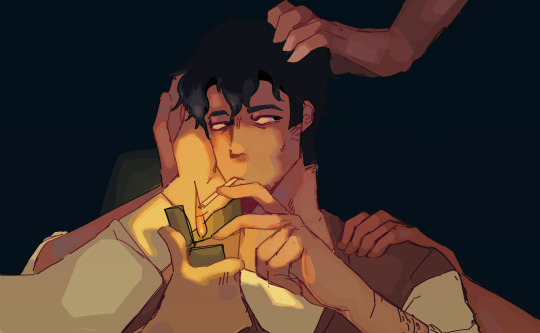
this feeling, it's yearning to be satisfied
268 notes
·
View notes
Text
Kazui Sexuality Analysis
For the past few months, i’ve convinced multiple people that Kazui Mukuhara is gay— and with the introduction of the Cat MV, I felt it’d be good to make a master list documenting exactly why the theory came across. Primarily to indoctrinate people. Sorry. Thank you @prisoner-000 for helping me with this! >_< ( Despite me initially being the one indoctrinating you lol! )
TW : Open talk discussing Suicide.
WARNING : Spoilers for Trial 2.
Welcome to the ride.
Also I forget Hinako canonically has a name so she’s referred to as “his wife” the whole time. Oops..
Let’s start with the First Trial Voice Drama: “Gouging in the Night” / “Another Night”.
With this being an introductory voice drama, it’s hard to necessarily gauge much of the depth regarding Kazui’s character, but we do get our first introductory to his heavily emphasized ‘lying’ aspect of his character. We also get multiple instances in which he identifies adults with being those that cannot act on their emotions, as Kazui did, because in doing so makes them ‘weak’. Es refers to Kazui as someone with a fake smile, that’s been “consciously crafted to show himself a certain way”, which can be common in those that have experiences having to mask their identity due to a rough home-life / lack of being understood by peers around them.
“What's so good about it? I don't like this.It's just a fake smile that you've consciously crafted to show yourself in a certain way. You're acting based on how you want others to see you - your face clearly shows that you're lying.”
“This is, this is.... You're pretty strict. * Laughs* it's not like I'm not scared at all, either. But I've got the responsibility that comes with being older, too - even in an abnormal situation like this, there's no way I could just let myself panic in front of the kids. Well, even if it's fake, adults need to keep up a smile... in order to not let you young ones down, you know.”
Having to keep up a ‘mask’/‘facade’ in order to keep those around him happy.
—— • ——
“If you say that I'm lying.. You might just be right. Unfortunately, once you're an adult, you get very good at lying.”
“.. Adults, huh?”
Another brief mention of ‘lying’ being natural for adults.
—— • ——
“I... see. It might be as you say. We just become more and more passive to avoid causing pain. Yeah... that's right. It's true that my lies killed her, and even now, I still haven't changed. No, that's not it - I can't change because I was already born this way. But... Don't talk big without even knowing a thing about my feelings, kid.”
“...Nice to meet you, Kazui Mukuhara, it feels like I've finally come face to face with you. Well met, I am Es, the prison guard of MILGRAM.”
“* Exhales, chuckles * Such a fashionable way of greeting, huh? Well, hopefully, you won't come to regret this. These kinds of relationships tend to bring pain with them.”
Despite his wife dying, he says he has not changed, despite all the guilt he supposedly holds for her suicide.
A vague remark regarding their relationship being inherently ‘painful’, despite it being shown that they seemed happy in their relationship. This is emphasized in the “Cat” MV, where you get a better glimpse at their personal relationship.
—— • ——
“As you know, with this personality of mine... I have trouble talking to others about myself openly. I guess, despite physically being as big as I am, I've still got a cowardly side to myself.”
“I'm not interested in your self-deprecation.”
“There's something I'm thinking about now, with this situation... I... all of my sins and weaknesses that I've been hiding... I might have been subconciously waiting for for someone to forcibly uncover them all along.”
He has been “subconsciously waiting for someone to forcibly uncover them,” which implies a sense of relief when he is finally uncovered as a liar. He would not have to show face, or lie about himself.
This is common in gay people who cannot reveal their identity due to negative reception/social status. It is easier to hide than it is to reveal and be honest with those around you, though that relief would still exist.
—————————————————
The “Half” MV.
the title for half could easily be showing a one-sided love— only one ‘half’ sharing that love.
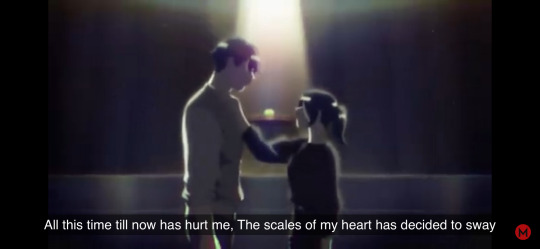
“If only your heart would change, but that’s not possible.”
Here we begin with the first bits of implication, and strongly at that. The description of the video highlights a lyrical piece I believe is incredibly important— as I personally believe it’s him speaking to himself. He had no reason for his wife to have a change of heart, he is shaming himself here. He has openly stated he dislikes himself, so it’s not necessarily surprising.
“Laughing together, side by side, this distance in our relationship is misleading me. Is this what happiness is?”
Under the idea that Kazui seeked compassion and love in a relationship, as it’s hinted at in “Cat”, it’s likely around this time that he actually began to realize that he had struggled to be attracted to her beyond face value. What he lists is not inherently romantic, and in fact can be viewed as a lyric about a best friend whom viewed him as a lover.
“Where did I go wrong? Probably from the beginning,
Please tell me what I should do, feelings shrouded in lies will float away and disappear”
He’s beginning to understand that his feelings aren’t attraction to her, but built up on the ideal of what attraction should be. Kazui mentions that his parents would be disappointed in him now— and that begs the question, why? His life was generally exactly as you’d expect if not more from an adult man. He seemed to have a well-off job, a loving wife, and the only thing missing is a lack of kids. There was nothing there to disappoint them in the first place.
“I could try you, and I could touch you, but you probably wouldn’t notice
I understand that this love is out of bounds, so nothing has to change”
After these lines, likely referencing Kazui’s inability to grasp their relationship romantically, he is shown to stare up at his audience member self. I am under the belief that there are two Kazui’s: the one masking his sexuality, and the other painfully aware of it. The ‘actor’ (masking) one proceeds to gesture his head over for the audience member to proceed to the right— and this is where he sees it.
The “Forbidden Fruit” Motif
This will be referenced in both MV’s.
It’s hard to explain the origin of the “Forbidden Fruit” idea, but the generalized concensus for the usage of this motif in media is the following :
As a metaphor outside of the Abrahamic religions, the phrase typically refers to any indulgence or pleasure that is considered illegal or immoral.

Kazui’s forbidden fruit motif is intense. The representation of it through a green apple is something he finds with distaste, stepping away from it and staring aghast.
“All this time till now has hurt me. The scales of my heart has decided to sway.”
Kazui is unhappy. He is admitting to that unhappiness, even being pictured in the MV as this is when he confessed to his wife.
“If continuing to hide is called unhappiness, not even one word will get to you.”
I’m not sure what to make of the second part, I believe to an extent this is her ‘denial’ of his feelings. A fear that this is happening, something that is truly real. Kazui openly states he’s unhappy, and she cannot fathom that. Reasonably so.
“I’m sure nothing will change and we’ll laugh together and call each other stupid names.
So many things I wish I hadn’t known, i’m just a coward.
Why is it questioning me now?”
Kazui wished to remain friends. And that broke her. That broke her enough to which she ended up committing suicide. He was oblivious, and let his emotional side get to him— this is why he insists on the fact he “failed when he prioritized his emotions.”
—————————————————
The Birthday Art
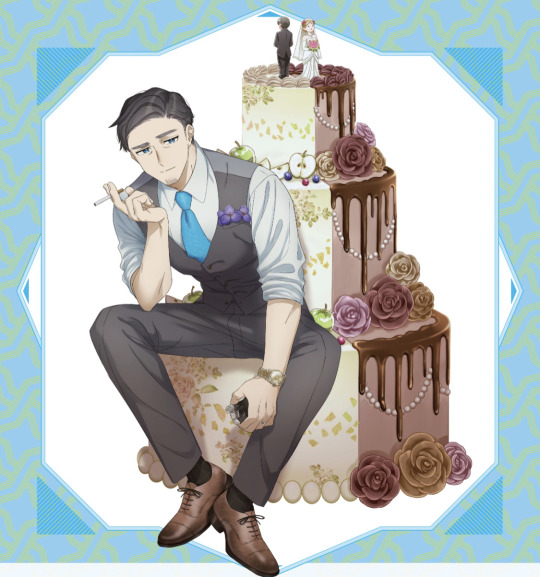
For their birthdays in 2021, Milgram released art + merch with the characters, with flowers representative of aspects of their characters. Flower meaning plays a large role in this.
Kazui has a spiderwort on his vest. This can be representative of “wisdom” or “I respect you, but not in love”. Uh.. do I really have to hyper-analyze this?
—————————————————
Second Trial Voice Drama : “ Imposter Boulevard “
FINALLY. Dead confirmation that the cheating theories are entirely false— which begs the question of ‘What the hell is going on with this man?’ … You know why we’re here.
In this voice drama, i’d argue he’s incredibly open about the fact there’s more to him than we initially believed. Thank you Onigiriico for the translations!
“That’s ridiculous. If you can save someone by telling a lie, that’s what you should do.”
“However… You killed someone with your lies, didn’t you?”
��… Ah… You forgave me, didn’t you? Aren’t you being especially strict towards me?”
He admits that lying in order to save someone is where his moral compass lies.
“Marriage is something that both partners want equally, isn’t it? It’s something you can’t do if only one person wants it. Deciding to treat it as a punishment all on your own… You’re making a mockery out of it.”
“I really am. Ah… She must have thought so as well. My wife, that is.”
“I’ve said this before: You’re a liar. Those lies have killed a person.”
No notes. You get it.
“I despise myself for lying, too. Being a liar, you see – it’s painful.”
“Heh. Then just–“
“So I’ve tried to change! I’ve tried to change. I have tried to stop lying to myself and others!”
“…”
“I’ve confided in others. I’ve tried to be myself! I’ve tried to just be the way I was born!”
“…Hey, Kazui–“
“It’s not my lies that killed her. She’s dead because I stopped lying to her! If I had just kept lying- She wouldn’t have died…!”
The implication that he has had to ‘confide’ in others, attempting to be himself rather than the masking he has done all his life.. and now here he is, in Milgram, reminded of his past. Hauntingly, almost.
“All the lies I’ve told are tying me down. Ever since I was little, I’ve never truly opened myself to anyone. But in the end, people can’t be saved if they don’t [open up]. And by now, it’s gotten to a point where I can’t do it by myself anymore…”
( machinery whirrs, bell rings )
“I did think Milgram would be able to force its way past that, though.”
He’s hidden he was gay since he was a child, but he knows the Milgram Prison of all things can dig into his memory and force him to confess.
—————————————————
The “Cat” MV.
With the active removal of the ‘cheating’ theory people centrically revolved towards, the introduction of the “Cat” MV was something i’ve been looking forward to for a while now due to the possibilities that it contained. And possibilities it showed, investing in the origin of the couple we’ve been following for so long. Two coworkers turned into a married couple, happily together with one ‘small’ issue. Kazui seems to recognize that his feelings for hers do not match what she wishes.. after they’re married.

“I just wanted to touch, to caress, i just wanted to be touched. So it’s wrong? Shove that!”
“If it’s for the sake of true love, who wouldn’t lis for that?”
Kazui is seeking attention. He views romantic relationships as capable of giving him that, and assumed that’s what the relationships entail. In doing so, he’s indirectly ‘using’ her for the romantic aspects he’s unaware he doesn’t reciprocate. He views this as the normality for relationships, assumably having not been in many before then.
“Love (plus) Destiny = Crap
Smash it, shatter it, bye-bye
That sticky-sweet sequence: Dinner + Camouflage + You-Know-What
Loving Affection (minus) Love
Victim and Perpetrator, let’s keep it simple”
A long collective of lines, but it’s perfectly representative of what I previously stated. Kazui cannot understand what is meant to be a romantic relationship. In discovering what he believes to be one, he lashes out, assuming that relationships are something that he deem more inconvenient than the exciting things that are talked about in stories.
This is where Kazui begins to realize he is not happy in his relationship, and it is not because of his wife. And of course, in response to this distress— not too long later in the video, the green apple returns.
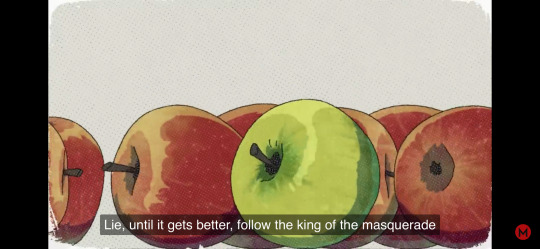
The return of the “Forbidden Fruit”, a constant reminder that he is living a lie. I don’t believe this is directly meant to symbolize his homosexuality, but rather the aspects of it he is trying to ignore. He is hiding the things he knows will hurt her, even if it hurts him. As stated in one of the lines during this sequence:
“All the things I wanna do that I can’t say out loud, I gotta keep it inside and act.”
He has conformed to the idea of just being another actor playing his role in life. This will crumble soon. For both their sakes.
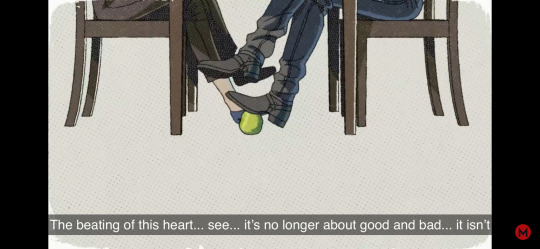
Quickly, the sequence shifts once again to Kazui’s inner dialogue.
“I can’t stop, I can’t be normal
This feeling, it can’t be gratified
This feeling, it yearns to be satisfied”
Kazui yearns for what he can’t have: a relationship where he shares the feelings his partner does. He yearns to love and be loved. He is an adult, far too late in his life ( in his eyes ) to do so. It’d be selfish to turn back now and begin a new life, but it’s just as painful to live a lie of loving someone he just is not capable of loving. This is why the sequence breaks so quickly.
He cannot confide in the smoking he is indulging in to cope, quickly taking the animal and taking a bite, representative of him tearing their marriage apart by his ‘confession’.
“I want to be loved, just like a cat”
And then his wife is shown to die, him bloodied from the animal and nothing but the facade left in the dust.
Kazui Mukuhara and Hinako Mukuhara were never meant to love. But in Kazui’s desperation, and Hinako’s love, they’ve created a lavender marriage(1) webbed in lies and deception— and the only way a love story like this ends is in tragedy.
—————————————————
Interrogation Notables
Who do you respect?
“You wouldn’t know them, but I have a childhood friend. I really look up to them. Sorry for bringing up someone you have no clue about.”
Do note that this “childhood friend” he briefly mentions has had he/him pronouns in a few translations. It is also notable that he mentions said childhood friend owns a boat. And guys like boats idk im grasping for straws here as usual
Is your family proud of you?
“No. They must find me embarrassing.”
Logic or Emotion, which do you prioritize more?
“I’ve failed before when prioritizing emotions. I’ll never act on my feelings again.”
Do you like yourself?
“Well, not really.”
If the world were to end tomorrow, what would you do?
“Relax and go traveling, I guess. That childhood friend I talked about before has a boat.”
Do you regret your “murder”?
“I do regret it. I should’ve continued to just pile up my lies.”
Do you want to be forgiven?
“I don’t know. I do think I want my weakness to be accepted, if I were to be honest.”
—————————————————
Extra Speculation/Key Notes
The René Magritte painting comparison is something that’s notably been pointed out since Cat’s release, being that one of the shots mimics a painting of René Magritte’s very closely— though, one would mark it as coincidence, the comparison and meaning behind the piece actually makes it appear intentional.
The meaning behind the painting ‘The Son of the Man’, or in Margritte’s words, is “Everything we see hides something else. We always want to see what is hidden with what we see but this is not possible. Humans hide their secrets very well.” This is clearly intentional, given Kazui’s open inability to just confess to his ‘lying’ himself- entrusting on Milgram to open up his mind and make him confess to something he has hidden ‘since he was young’.

The “bartender”, or as the fandom has dubbed him “Kazui’s gay lover”, is a very popular outsider character to Milgram due to his seemingly close connection to Kazui. He is shown in both the “Half” and “Cat” as a sort of friend to him— a connection to the bar he is familiar with, and even resorts to in rough times. In the “Half” MV he is notably missing a wedding ring, whilst at the “Cat” wedding he is wearing one.
Many people theorize that Kazui recognized he had feelings for this man, and that was his way of recognizing that he was gay, whilst the feelings were unreciprocated due to him being assumably married. In a shot in “Cat”, Kazui is seen staring into a glass, although it’s unknown where or whom he is speaking to. A line says the following:
“Hey, so what if I said I like-liked you, what would you do?”
This is post-wedding, clearly thanks to Kazui’s scuffed appearance. But that is in no-way you would speak to your wife, is it not? It is easy to assume that he is speaking to the bartender in this instance.
DO NOTE : It is possible the bartender is not featured in the “Cat” MV, and it happens to be a design incredibly similar. He was in the center of the shot though, and that’d be an insane coincidence IMO.


@prisoner-000 : “ The roles he takes on in the play (Soldier, office worker, host) are anchored in masculinity, at least in their societal perceptions. His actor costume is supposed to represent his status as an actor even more clearly. (There seems to be a recurring motif of him as an “actor”). “
@prisoner-000 : Portal interaction addition.
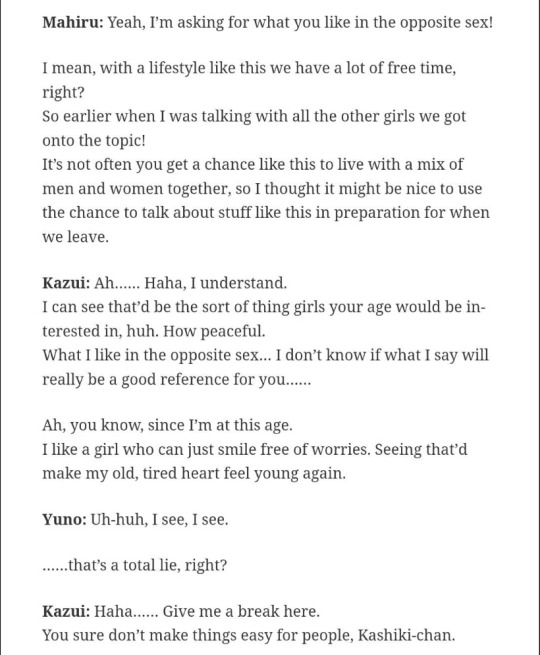
—————————————————
I LOVE YOU KAZUI! 🫡🏳️🌈
I hope this does him justice..
I put a lot of effort into this, it would mean a lot if you interacted so more people could see. Thank you for reading!!
#milgram#kazui mukuhara#mukuhara kazui#very mixed on how i feel#but innocent imo#007#i forgot his prison number
141 notes
·
View notes